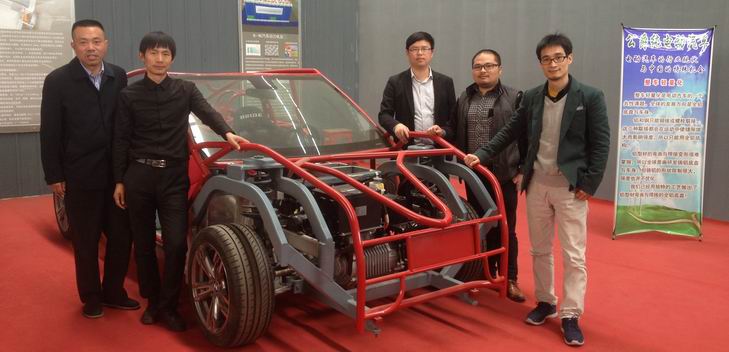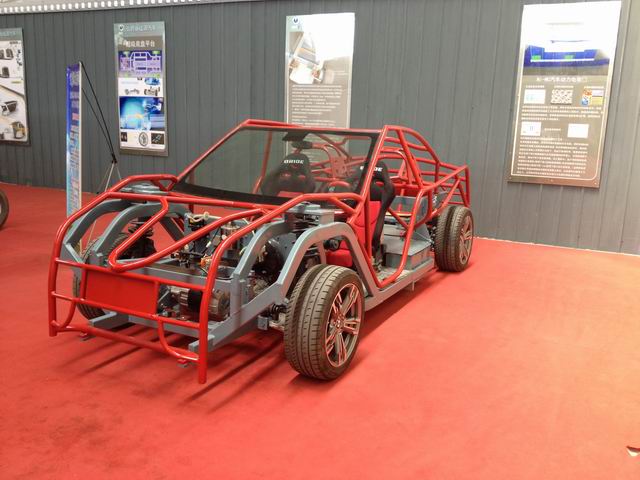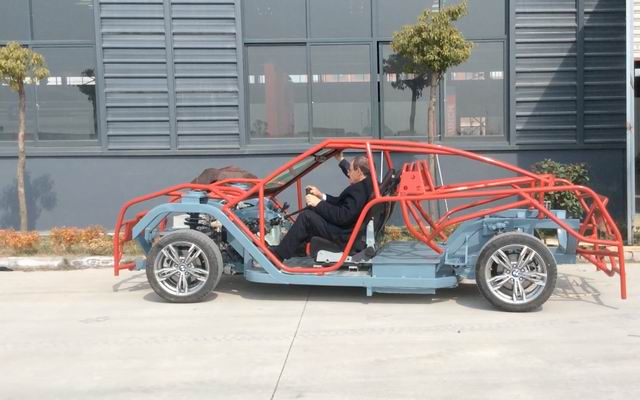Tested by the National Center of Supervision and Inspection on New Energy Motor Vehicle Products Quality
Wuxi, China- The DESIS Lab of Jiangnan University and Jiangsu Duke New Energy Vehicle Company are pleased to announce a breakthrough innovation in electric vehicle as collaboration between them. The jointed R&D team has created a prototype with radical progress in key performances: the time of a full charge is reduced to 15 minutes, and it allows 430 km range of use in the speed of 80km/h. The prototype vehicle of EV 3.0 has been tested by the National Center of Supervision and Inspection on New Energy Motor Vehicle Products Quality (www.smvic.com.cn) in Shanghai in this April.
The global challenges in environment and energy call for innovation in new energy vehicle. In last two decades EV industry has drawn large attention and resources; although technologies and related services have been widely investigated and developed, neither traditional car manufacturers, nor new energy companies have produced a pure EV vehicle that is accessible to a large consumer audience. In the past years, many transition products, like hybrid power train, and different business models of recharging services were launched into the market, with very modest impact; some governments like China have been promoting policies to support the industry.
The general debate insists on discussing the infrastructure and the recharging system; JU and DUKE collaborative project is focused on the EV itself: the team believe the main performances of vehicles (including range capacity, charging time, speed, safety) need to be fully developed in order to reach impact in the consumers behaviors, and to gain a solid role in people's everyday life. Among those performances, the full charging time is a crucial bottleneck for the development of EV mobility system. Under these concerns, the team has been exploring for a radical solution, “EV 3.0”, a prototype vehicle with distinguishing features as follows.
Length*width*height (mm)
| 4190 * 1650 * 1445
|
Weight (kg): 1750
| Seating capacity: 4
|
Top speed (km/h): 120
| Max gradeability (%): 25
|
Full charge (min): 15
| Range, 80km/h (km): 430
|
Battery type: Ternary Li-ion Battery
| Battery capacity (kwh): 65
|
Efficiency, kwh/100km (kwh): 15
| Acceleration, 0-100km/h (s): 10
|
The core of the EV 3.0 includes a battery pack and an aluminum chassis. As a matter of fact, both of them are in one body: an integrated EV platform, which creates a complimentary system to reach the balance between key features in strength, weight, space, safety, charge, range and temperature. The platform changes the idea of sedan and building a new model of EV concept. In addition, the cost of vehicle is well controlled for mass market.
EV 3.0 is a design-driven innovation. It embeds a vision for mobility industry and opens new market opportunities. As radical innovation, the team employs interdisciplinary co-creation process and integrates advanced technologies across industries with strategic design thinking. Therefore, the new challenges in innovation call for new design culture, principles and methods, also for new design education. As an outcome of research collaboration of a design institute and car industry, the project consolidates a new idea of design, which School of Design at Jiangnan University is promoting and putting into practice.
EV 3.0 has been already presented in the fifth Jiangnan University DESIS symposium (November 2014, Wuxi), and at the China Academy of Engineering Seminar on Design for Innovation (December 2014, Yangzhou). It drew positive reactions from academy, industry and government officials. After the official test in National Center, the team is working to polish the prototype and looking for industrial cooperation. It must be a long way from prototyping to industrialization; however, the EV 3.0 team is confident that this innovation will largely impact on the interest and the consideration of EV as a valid alternative to fuel vehicles.
About the DESIS Lab of Jiangnan University
DESIS Lab of Jiangnan University is part of “Design for Social Innovation and Sustainability (DESIS)” network association (www.desis-network.org) and DESIS-China as a founding member. It’s a design lab engaging in research, teaching, and social services focusing on strategic design for sustainability, multidisciplinary design and social innovation crossing the fields of food, mobility, active welfare, healthcare, and cultural heritages.
About Duke New Energy Vehicle
Duke New Energy Car Vehicle Company is an emerging company in Nantong, China. It focuses on the R&D and production of pure electric vehicle. With strong innovation competence and technological strength, DUKE aims to develop and promote the next generation of electric vehicle to mass market, being a leading company in EV industry.
Contact
To learn more about the project, please contact:
Miaosen Gong, PhD, Associate Professor
DESIS Lab, School of Design, Jiangnan University
1800 Lihu Avenue, Wuxi, 214122, China
Tel: +86 510 85911500, Fax: 85501491
Miaosen.gong@foxmail.com

the core team of ev3.0 project

A functional prototype a

A functional prototype b


